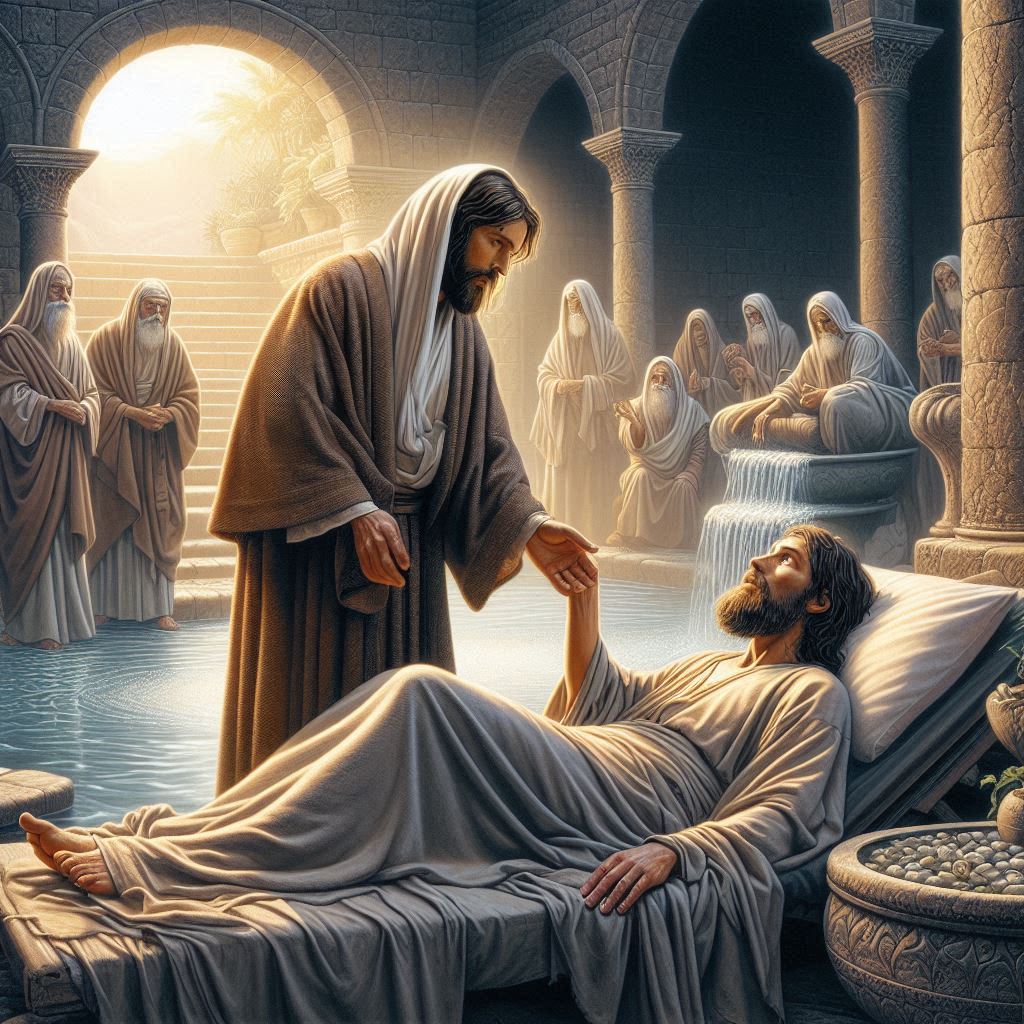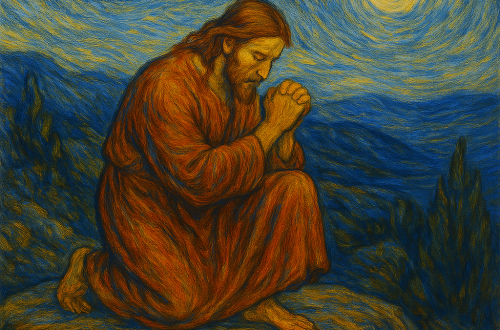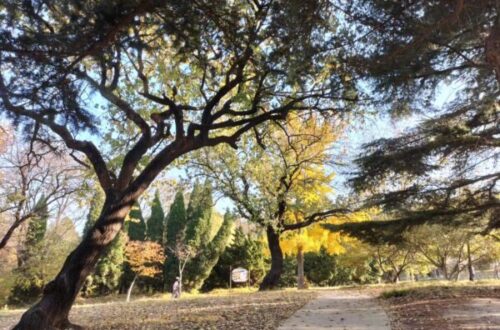
John 5

1 Some time later, Jesus went up to Jerusalem for one of the Jewish festivals.
2 Now there is in Jerusalem near the Sheep Gate a pool, which in Aramaic is called Bethesda[1] and which is surrounded by five covered colonnades.
3-4 Here a great number of disabled people used to lie – the blind, the lame, the paralysed.[2]
5 One who was there had been an invalid for thirty-eight years.
6 When Jesus saw him lying there and learned that he had been in this condition for a long time, he asked him, ‘Do you want to get well?’
7 ‘Sir,’ the invalid replied, ‘I have no-one to help me into the pool when the water is stirred. While I am trying to get in, someone else goes down ahead of me.’
8 Then Jesus said to him, ‘Get up! Pick up your mat and walk.’
9 At once the man was cured; he picked up his mat and walked. The day on which this took place was a Sabbath,
10 and so the Jewish leaders said to the man who had been healed, ‘It is the Sabbath; the law forbids you to carry your mat.’
11 But he replied, ‘The man who made me well said to me, “Pick up your mat and walk.” ’
12 So they asked him, ‘Who is this fellow who told you to pick it up and walk?’
13 The man who was healed had no idea who it was, for Jesus had slipped away into the crowd that was there.
14 Later Jesus found him at the temple and said to him, ‘See, you are well again. Stop sinning or something worse may happen to you.’
15 The man went away and told the Jewish leaders that it was Jesus who had made him well.
16 So, because Jesus was doing these things on the Sabbath, the Jewish leaders began to persecute him.
17 In his defence Jesus said to them, ‘My Father is always at his work to this very day, and I too am working.’
18 For this reason they tried all the more to kill him; not only was he breaking the Sabbath, but he was even calling God his own Father, making himself equal with God.
19 Jesus gave them this answer: ‘Very truly I tell you, the Son can do nothing by himself; he can do only what he sees his Father doing, because whatever the Father does the Son also does.
20 For the Father loves the Son and shows him all he does. Yes, and he will show him even greater works than these, so that you will be amazed.
21 For just as the Father raises the dead and gives them life, even so the Son gives life to whom he is pleased to give it.
22 Moreover, the Father judges no-one, but has entrusted all judgment to the Son,
23 that all may honour the Son just as they honour the Father. Whoever does not honour the Son does not honour the Father, who sent him.
24 ‘Very truly I tell you, whoever hears my word and believes him who sent me has eternal life and will not be judged but has crossed over from death to life.
25 Very truly I tell you, a time is coming and has now come when the dead will hear the voice of the Son of God and those who hear will live.
26 For as the Father has life in himself, so he has granted the Son also to have life in himself.
27 And he has given him authority to judge because he is the Son of Man.
28 ‘Do not be amazed at this, for a time is coming when all who are in their graves will hear his voice
29 and come out – those who have done what is good will rise to live, and those who have done what is evil will rise to be condemned.
30 By myself I can do nothing; I judge only as I hear, and my judgment is just, for I seek not to please myself but him who sent me.
Hello everyone, I am kiki. Chinese name of our second phase of the program is “读经大讲堂”. The English name is “Bible study”.
We will adopt a relaxed also enjoyable learning mode to take you into a new learning world. Each time I will make a personal summary and analysis from the perspective of a learner, and then Sister Ingrid will help me conduct in-depth learning and problem discussions with everybody.
I hope that such an interesting and interactive process can bring new knowledge experience to you all. The following is my interview with my sister on related issues. Today is the nineth lecture on the Gospel of John 。Everyone is welcome to leave a message in the comment area for discussion!
My summary of John nineth time study:
Hello everyone, the following is a summary of my study.
One day during a festival in Jerusalem, Jesus healed a man who had been sick for 38 years by the Pool of Bethesda.
The man broke the Sabbath by picking up his mat and walking on it, but Jesus told him to do so.
Although the Jewish leaders disagreed, the man had no idea who Jesus was because he had disappeared into the crowd.
Later, in the temple, Jesus warned that man not to sin again.
The man then revealed that Jesus had healed him, causing this thing some Jews to resent Jesus even more.
Jesus defended himself by saying that God was always at work and so was he. This comparison with God angered these Jews even more. The Jews thought Jesus was too self-righteous.
Jesus explained that he only did what he saw God doing.
Whatever God does, Jesus does too. God gave Jesus the power to judge, and everyone should respect Him as they respect God.
Those who listen and believe in Jesus will receive eternal life, and one day the dead will hear His voice and be raised to life.
Jesus will judge based on what he hears from God, ensuring fair judgment.
Because this section of the Bible is difficult to understand, I would like to ask my dear sister Ingrid to explain it to me.
Sister’s comment from my studying summary
Hello sister, you already have mentioned the most important things in this story. Beside of this, I can mention, that the man was 38 in that place and when Jesus spoke to him about healing, he lamentaded about that nobody carries him to the water.
But the good question is: whom brought him food all the years long. Sometimes we are so focused on ourselves and our wishes, that we don t see the people around us who already are helping us.
When the Parasies told him not to carry his bed, instead of giving glory to God about his healing, he blamed Jesus, that he was the one who told him to do this.
Jesus knew how he will act: That he will carry on to put responsibility on the others and blame those who helped him. Therefore Jesus said: Don t sin again, it could be worse with you.
Question list part: base on John 9th items:
Okay.Base on above bible study content, now let me ask sister some related questions. We hope the following questions can be helpful to brothers and sisters who have just become Christians.
Sister,how did Jesus demonstrate compassion and healing towards the man at the pool?
He saw that the man was in his bed there for such a long time and without any hope. Even it may have occured because of sin, Jesus looked at the hopeless of the man and offered healing. The interessting here is, Jesus offers healing and the man answered with blaming the people.
What significance does the healing on the Sabbath hold in terms of Jesus’ authority and the reaction of the Jewish leaders?
In the jewish law, the Sabbath was written as a resting day for the honor of God. But the Jewish leaders made the law stronger and said, you must not do anything on a Sabbath. Therefore they became so angry when Jesus healed on a Sabbath.
But there is a deeper reason, too: They were the leaders and the people obeyed them. When somebody comes and keeps on breaking the sabbath, they feared to loose their power in other areas of the life, too.
In what way did Jesus teach about his relationship with God the Father and the authority given to him as the Son of Man?
Jesus does all what he sees his father doing. And he says in another vers: Those who see me, see the father. Jesus has got the authority over judgement from the father.When Jesus will return one day, he will come as a king and judgeman .
How did the healed man respond to the Jewish leaders questioning him about carrying his mat on the Sabbath?
He left the responsibility for this action over to Jesus. He blamed him for telling him to do this.
Sister,what implications does Jesus’ statement about the Son’s ability to do what he sees the Father doing have for our understanding of his work?
The father wants to save humanity, so the Son is saving humanity on earth.
How does Jesus’ teaching on judgment, honor, and eternal life impact our beliefs as Christians?
Those who honor Jesus, honor the father. And those who hear the Word and believe in the Father won t come under Judgement, they go directly to the eternal life.
People with an active conciousness are aware,that there must be a judgement after death. Many are ocupied with having a good karma for not to be punished at the end of life, other do a lot of spiritual works for to go to paradies.
Jesus says, we have to repent from these death works. The only way we can enter paradies is to belief in God Father who loved the earth so much that he has given his son for us, there is no other way than Jesus. All other things are religion an death works.
But when we repented from religion and death works, we do good things, not because of fear of punishment but because we love Jesus so much, that we would like to please him.
What does Jesus’ assertion about giving life and judgment signify about his role as the Son of God? I think Jeues’s anwer is very abstract.
When Adam and Eve fell in sin, the judgement over them was death and that is why we all have to leave our earthly body and die.
But we still have a living soul, who has to be saved and the soul is eternal. In all religions the soul comes under a punishment after death, because there are things which are obvious, which all people know.
The righous punishment would be, that we all get death and there is no redeeemer. But God s wish is, that all people will get saved.
That is why he sent Jesus to earth for to die at our plass at the cross.
The only reason one person goes to the lake of fire and to hell is to refuse Jesus or to act against his or hers conciesness, if they never heard the gospel.
And this is why God father has left the judgment to Jesus. Since he has been human being and God at the same time, his judgment is righious.
How did Jesus emphasize the importance of belief and hearing his words in relation to eternal life and judgment?
We hear a lot of things and philosophy during the day. We can believe in Konfzius, Buddha, the virgin Mary and a lot of stuff at one day.
But believing in Jesus means, I believe only in him and his word. That I stop to hear a lot of philosophic voices, who are all nice ideas, but are not living words.
In the next chapter, a lot of people will leave Jesus, but Peter says: Where should we go: You have living words. And when we believe in his words, there will be rivers of waters flowing out of us.
Sister,what can we learn about the nature of Jesus’ authority and his ultimate purpose from his teachings in this passage?
First of all, Jesus has compasion with everyone. He does not make difference between the obeying and disobeying people, he calls them all. In the last capture we heard of the Samarian woman who obeyed after her call and here we had a disobeying man who went on in sin after his healing. Jesus treats them all by the same manner.
But when we refuse Jesus after meeting him in our life, when he did something for us and we feel or know that it was him, we are responsible to anwer the call. In the book of Job we read, that God calles twice or three times a sinner to repent, when the sinner did not answer, he will not arise to life on the last day, he will arise to judgement and go with the devil and the demons to the lake of fire there he will suffer in eternity.




